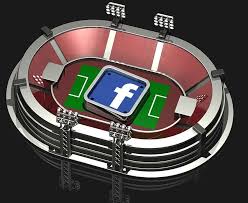By Paul Nicholson
October 9 – Expectations that Facebook will be the next premium tier sports rights buyer that pushes broadcast fees into the next level financial stratosphere are likely premature. While the global social media giant has plenty of cash and bandwidth, it is its bandwidth it is selling and not its cash it is spending.
Speaking at a press briefing last week and following up at the Leaders Business Summit in London the following day, Facebook Head of Global Sports Partnerships Dan Reed said that “it’s still very early days and there is no template for this (big rights acquisitions).”
Facebook’s numbers suggest that it could easily become a player for any rights it wants – 2.01 billion accounts on FB, 800 million on Instagram, 1.3 billion ion FB Messenger and 1.3 billion on Whatsapp is a huge global reach.
It is this connectivity that Facebook sees as bringing value to sports, not the cash-for-rights scenario.
“We have ongoing partnership with clubs in virtually every league in the world,” said Reed.
“We have really become a fixture in the ecosystem of sports. We are a platform. We are not just a marketing vehicle, we are not just a video destination, we are all of those things.”
More than 3,500 live events were broadcast in Facebook in the first half of 2017. Facebook reckons it has 650 million fans on Facebook and 200 million on Instagram.
Whichever way a rights holder looks at it, Facebook is a player in their commercial mix even if Facebook doesn’t have money for their rights. “Our goal is to help rights holders reinvent sports distribution, production and viewing,” said Reed.
When it comes to monetisation Facebook says that targeting people with ads and selling merchandise and tickets are the main revenue opportunities. Reed points to NFL Miami Dolphins as an example of how it is done, saying that 30% of ticket sales in 2016 for the SunLife Stadium were via Facebook leads. Branded video clips are the obvious other use of the Facebook platform, with Neymar’s Snickers video being an example.
This isn’t to say that Facebook has no interest or role in live sports distribution, but this is very much in the no-money area of partnerships. That said the company did partner with Fox Sports for live UEFA Champions League rights, and did pay for rights to stream MLS games – but these are tiny deals in the global big league sports rights business.
Reed said that Facebook can have a role in distributing to ‘dark’ markets (territories where rights have not been sold but exposure could be useful).
Facebook’s new video platform Watch – perhaps best described as OTT-with-benefits – is the closest it has come so far to long-form broadcast programming and curates video content for its partners.
Contact the writer of this story at moc.l1751496919labto1751496919ofdlr1751496919owedi1751496919sni@n1751496919osloh1751496919cin.l1751496919uap1751496919

